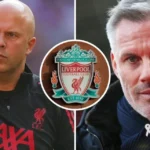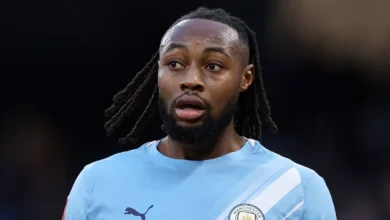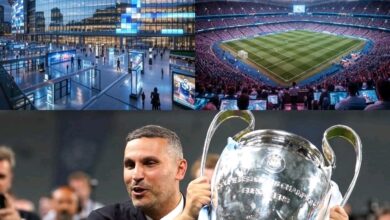Liverpool Star confirmed club exit

Football is full of stories of glory and heartbreak, of joy and pain, of heroes rising and then falling when nobody expected it. At Liverpool right now, one of those stories is being lived by Federico Chiesa. The Italian winger, who came to Anfield with so much expectation, has already seen the highs and lows of football life in England. From scoring a decisive late goal that gave Liverpool fans hope at the start of the new season, to the shock of being told he would not be part of the Champions League squad, Chiesa’s journey has turned into a tale of ambition, disappointment, and determination. And behind it all, whispers of an argument with manager Arne Slot and questions about his behaviour in training have now come into the open.
Chiesa’s Liverpool career has never been simple. Last season, he struggled with injuries and adaptation, making only 14 appearances. For a player of his reputation, who had been one of Italy’s heroes during their Euro 2020 triumph, it was a bitter pill to swallow. Many thought his move to Liverpool might even end in failure. But this season began differently. In Liverpool’s opening game against Bournemouth, with the scores level and the tension building inside Anfield, Chiesa came off the bench and wrote his name into the story. In the 88th minute, he struck a goal that restored Liverpool’s lead and sent the fans into wild celebrations. For him, it was more than just a goal. It was a statement. It was a message that he was ready to fight, ready to prove himself, ready to show that he could still be a key figure in Arne Slot’s plans.
But football has a cruel way of turning joy into frustration very quickly. Chiesa has featured as a substitute in all four of Liverpool’s Premier League games so far this season, but then came the decision that shook him. When Liverpool’s Champions League squad list was announced, his name was not there. Instead, 17-year-old Rio Ngumoha, a teenager signed from Chelsea last summer, was chosen ahead of him. For a 27-year-old with Champions League pedigree, with 16 appearances in Europe’s greatest competition already under his belt, it was a decision that cut deep. Chiesa had been dreaming of Anfield nights under the lights, of facing the giants of Europe, of proving himself on the biggest stage once again. But those dreams were taken away with a single decision.
Arne Slot did not hide from the truth. He admitted that Chiesa was not happy when told he would not be part of the Champions League squad. And why would he be happy? For a player of his talent, being left out while a teenager takes your place feels like humiliation. Slot explained his reasoning, pointing out that Ngumoha could not be registered on List B because he had only just arrived from Chelsea. Rules forced his hand, but decisions are always more than just rules. Slot spoke of it as one of the most difficult tasks for any manager, to sit a player down and tell him that he will not even be in the squad. He explained his arguments, and Chiesa listened. He did not agree, but he did not fight either. According to Slot, Chiesa gave the answer that managers want to hear. He said he would help the team in the league and in the domestic cups. But behind those polite words, there was pain, there was anger, and there was disappointment.
In training, people noticed the difference. Chiesa’s body language spoke louder than his words. Some said he trained with more fire, trying to prove himself, trying to send a message to Slot. Others said his frustration showed in moments of silence, in the way he reacted when things did not go his way. Stories began to spread of an “argument” between the player and the manager. Not a shouting match, not a complete breakdown, but a clash of views, a disagreement about respect, about opportunities, about the future. For Chiesa, this is not just about one squad list, it is about what it means for his role at Liverpool. If he is not trusted on the European stage, what does that say about his place in Slot’s long-term vision?
The fans are divided. Some believe Chiesa has not done enough to deserve a Champions League spot. They point to his limited impact last season, his inconsistency, his injuries. They argue that Liverpool cannot wait forever for him to explode into form. Others, though, feel sympathy. They see a player who was once considered one of the brightest wingers in world football, now fighting for minutes and being overlooked for a teenager. They ask if Slot has been too harsh, if this could damage Chiesa’s confidence, if the club is wasting the talent they paid for.
The truth is, Chiesa’s story is bigger than just one squad list. It is about the clash between reputation and reality. At Juventus and with Italy, he was a star. At Liverpool, he is struggling to become more than a squad player. Football is ruthless. It does not care what you did yesterday, it only cares what you can do today. And today, Slot decided that Rio Ngumoha was more important for Liverpool’s Champions League squad than Federico Chiesa. That decision has left the Italian with a choice. He can accept it and fade quietly into the background, or he can use it as fuel to fight harder, to prove himself in the league and cups, to force Slot to regret ever leaving him out.
So far, his response on the pitch has been encouraging. Against Burnley, he came off the bench again, working hard as Liverpool fought to a narrow 1-0 win thanks to Mohamed Salah’s stoppage-time penalty. His attitude in that game showed determination. Slot himself admitted after the opening win over Bournemouth that Chiesa looked like a different player compared to last season. He said the Italian had a fresh outlook, that missing pre-season last year had left him behind, but now he was ready to handle the intensity of Premier League football. These are positive signs, but actions speak louder than words. For Chiesa, every minute he plays is now a test, every touch of the ball is a chance to prove he should never have been left out.
At 27, Chiesa is not a youngster with endless time ahead of him. This is supposed to be the peak of his career. He cannot afford to waste seasons sitting on the bench or being ignored in big competitions. His ambition will not allow it. That is why this story has become so dramatic. It is not just about football decisions, it is about a man fighting for his career, for his pride, for his place in the game. For Liverpool, it is about making tough calls in a squad full of talent but also full of expectations. For Arne Slot, it is about proving he can handle the pressure of managing stars, that he can take difficult decisions and keep the dressing room united.
The tension will not go away quickly. As the Champions League begins and Liverpool face Atletico Madrid on Wednesday, Chiesa will be watching from the sidelines, not even in the squad. He will hear the anthem, he will see the lights, he will feel the atmosphere, but he will not be part of it. That pain could either break him or inspire him. The story is far from over, but what happens next will define his Liverpool chapter. Will he rise from this setback and fight his way back into the picture, or will this be the start of the end, a slow fade that leads to an exit?
For now, all eyes are on his training sessions, on his minutes in the league, on his attitude in the dressing room. The whispers of an argument with Slot may be exaggerated, but they come from a truth that cannot be denied: Federico Chiesa is not happy, and when a player of his status is not happy, the whole club feels it. Slot insists the winger is still important, but actions will speak louder than words. And for Chiesa, every action he takes from here on will be watched closely by fans, media, and rivals alike.
The story of Federico Chiesa at Liverpool has become a story of survival, of pride, of determination. From the joy of that late Bournemouth goal to the heartbreak of missing out on Europe, it is a journey that captures the reality of football. One moment you are the hero, the next you are forgotten. But true champions find a way back, and that is the challenge now facing Chiesa. He must decide if he wants to be remembered as a disappointment at Liverpool, or as the fighter who refused to give up, who turned his anger into fuel, who proved his worth when the world doubted him.
Liverpool fans will hope it is the latter, because they know the talent he possesses. They know what he did for Italy, they know the skill, the speed, the power he has. They know that if he finds his rhythm, he can be the difference in big games. The question is whether he can find that rhythm in time, and whether Arne Slot will give him the stage to show it. For now, the silence has been broken. The unhappiness is clear. And the fight for Chiesa’s Liverpool future has only just begun.















